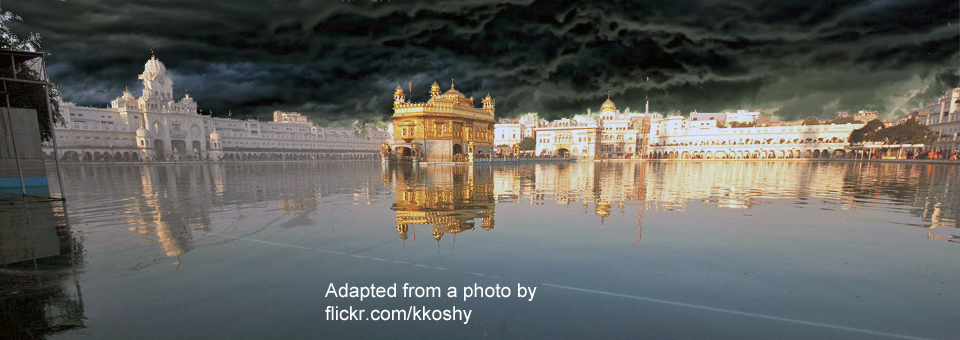Yesterday the UK’s Foreign Secretary William Hague revealed the findings of an official inquiry into British involvement in the invasion of Darbar Sahib, Amritsar in 1984. Undertaken by Cabinet Secretary Sir Jeremy Heywood, the findings largely cleared the then British Government of colluding with the Indian authorities to plan and orchestrate the killing of thousands of civilians in the Sikh World’s epicentre. The statement made in Parliament has widely been met with ridicule from the UK’s Sikh community branding the inquiry as a mere formality whose conclusions are unsurprising to say the least. Whatever one might think of the inquiry or these latest goings-on sparked by the release of Government correspondence from the time, it seems to me to be yet another example of the reactionary position that has been adopted by Sikh leadership and the Sikh masses themselves, and one needs look no further to understand why the status quo of our indecisiveness has been maintained for so long.
Fall-out from the publicly released documents that have for the first time proven British awareness and advice put to the Indian Government in the time leading up to 1984 has been predictable. There has been outrage within the Sikh community in Britain particularly, but also in other parts of the World, although slightly muted amongst younger generations elsewhere. Perhaps this is due to the undoubted sense of betrayal that is being felt by young British Sikhs whose relationship with this country has otherwise been quite strong. The main ideas that are emerging from the Sikh leadership is the demand of a further independent inquiry and the offering of an official apology from the British Government for their actions. As logical as such demands might sound, it is regrettably a continuation of the mistakes that have plagued our leadership and us as a people for over a century. Whilst I am not against the call for either an independent inquiry or an official apology, nor am I denouncing my Sikh brethren who lead these calls; I am stating that it is an all too familiar response from a community that no longer understands it’s ideology.
There are two questions that I have repeatedly contemplated over the last few years, sometimes vocalised in the pages of this website; firstly, what is it that we want to see done about the events of 1984 and then secondly, what outcome do we hope will follow from those actions taken (from the first question). Generally speaking, most Sikhs would like to see justice served, where perpetrators of both the Indian invasion into the Darbar Sahib and the Delhi Genocide following Indira Gandhi’s assassination, are put to trial and sentenced. There are then the related desires of making others (presumably non-Sikhs) aware of what took place and encouraged to be supportive or at least understanding of the present Sikh psyche. The resulting outcome that many Sikhs envisage (to answer the second question) is one where their respect and dignity is returned and some form of control over their own destiny can be implemented.
I have rejected this direction. Broadly speaking it does not fit within what I understand the Khalsa to be. Yes, I would like to see justice served – but justice is about more than punishment and acknowledgement of an event that has taken place. There are some wrongs that cannot be remedied and rectified, they can only be accepted for what they were and in this instance the attack on the Darbar Sahib was as the anthropologist Joyce Pettigrew put it, an attack to “suppress the culture, and political will, of a people”. That aim was so successful that the Sikhs who were its target, even those living hundreds and thousands of miles away are almost entirely removed in ideology, practice and self-worth from the emancipated thinkers that had arisen thirty years ago, inspired by the great Sant Jarnail Singh Bhindranwale. Not only are we enslaved, but despite the many accolades we use for the great Sant, the number of products we own bearing his face or the number of times we talk of his speeches, we haven’t understood his simplest message beseeching us to understand the mode of our slavery. It runs deep with psychological, social and practical elements which we refuse to engage with for fear of what we might find. I want justice, but justice is an equal playing field for the farmers and industrialists of Punjab; justice is the non-interference in minority groups across all of South Asia; justice is an end to nepotism and dynastic politics. That justice does not come from ‘the other’ – the slave master; it comes when the enslaved recognises that they have the power to take it all back.
I am not against the calls being made by our Sikh leadership, whomever they and wherever they are; I speak to them as their younger brother in the way that younger siblings do with a boldness that defies the logical processes and systems that we can construct when we allow ourselves to be controlled by fear. An independent inquiry and an official apology from Britain are akin to the luxurious hotels and spas frequented by modern day Arabs in the Middle East, when in reality the Sikhs are like the Arabs of old thirsting for an oasis in an unforgiving desert. So what should we be doing? Look to those who have trod this path before – Baba Gurbaksh Singh, Baba Maharaj Singh, Kartar Singh Sarabha, and of course Sant Jarnail Singh Bhindranwale. If Sikhs need an inquiry to reveal what took place at Darbar Sahib then it is patently clear that writers such as Ajmer Singh in ‘Veehvin Sadi di Sikh Rajniti’ and Gurtej Singh in ‘Tandav of the Centaur’ needn’t had bothered. If Sikhs need an apology to move forward after proof of British involvement in 1984 then SGPC member Kulbir Singh Barapind who remains imprisoned on political grounds in Punjab has wasted the best decades of his life. In my humble opinion we don’t ‘need’ anything to resolve our present situation other than to act, and not react.






